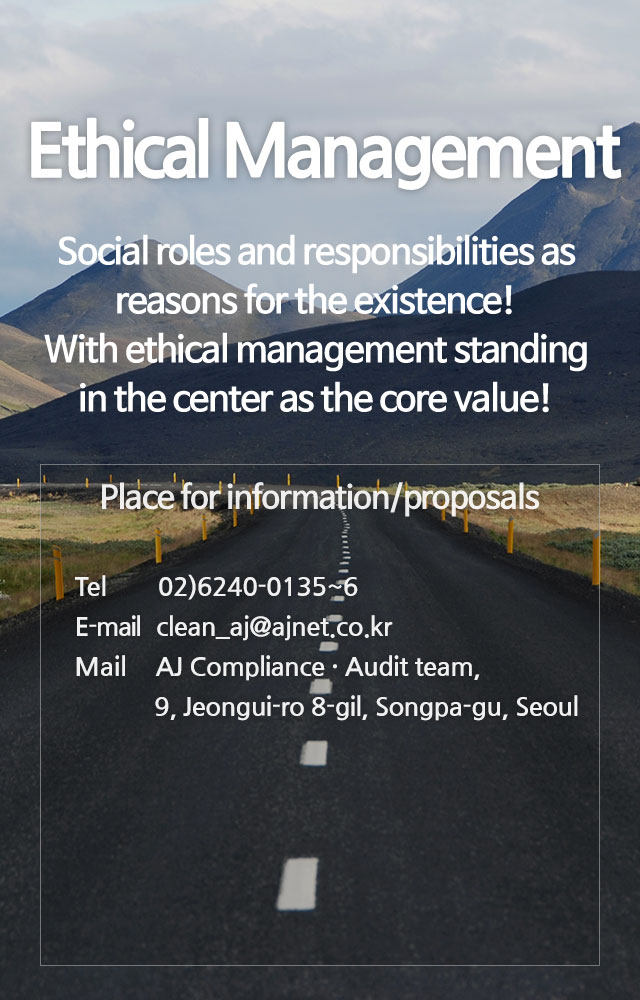
- Article 1 Purpose
- Article 2 Money (things of value) and gifts
- Article 3 Entertainment and hospitality
- Article 4 Wrongful conduct using one’s position or rank
- Article 5 Leasing personal or real property
- Article 6 Miscellaneous prohibitions of unfair conduct
- Article 7 Money transactions among executives and employees
- Article 8 Prevention of sexual harassment at workplace
- Article 9 Management of intra-company information and security
- Article 10 Penalty
- Article 11 Miscellaneous
- Supplementary provision
Article 1 [Purpose]
The purpose of these Ethical Practice Guidelines is to set forth the detailed principles of decision making and conduct for executives and employees related to the implementation of the Code of Ethics.
Article 2 [Money (things of value) and gifts]
1.The executives and employees shall not accept any money or gifts from partner companies or other interested parties (“interested parties”) under any circumstances.
2. In relation to money and gifts, the executives and employees shall not engage in any conduct falling into the following categories:
a. Accepting money or gifts from interested parties.
b. Requesting that the interested parties pay for loans, credit card debts, debts on purchases, etc.
c. Accepting things of value, clothing, various discount coupons, tour coupons, show admission tickets, etc.
d. Accepting these through family, relatives or acquaintances. This shall be deemed conduct by the executive or employee himself/herself.
3. In the event that the executive or employee accepts money or gifts from an interested party under unavoidable circumstance or if they become aware that such gift was delivered contrary to his or her wishes, he/she shall report and register such case to the ethics committee or the relevant office.
Article 3 [Entertainment and hospitality]
1. Business discussions and meetings with the interested party shall take place within the company, and the executives and employees shall not engage in any contact outside the company or accept entertainment and hospitality treats such as meals and drinks.
2. In connection with the entertainment treats, the executives and employees shall not engage in the following conduct:
a. Accepting sports (e.g. golf), entertainment, and other benefits provided by the interested party.
b. Accepting luxurious entertainment such as meals, drinks, karaoke bars, hostess bars, massage parlors, etc.
c. Accepting any entertainment or treats that damage the social rules and sense of morals in relation to any of the above.
d. Entertainments and treats received through family, relatives or acquaintances shall be deemed the conduct of the executive or employee.
3. In the event of holding meetings or business discussions outside of the company under unavoidable circumstance, meals costing KRW 20,000 per person, up to total amount of KRW 100,000, shall be allowed as an exception.
Article 4 [Wrongful conduct using one’s position or rank]
1. The executives and employees shall not accept any provision of favors in any form from the executives and employees of interested parties.
2. The executives and employees shall not demand from other executives and employees any kind of guarantees and financial products (insurance, etc.) or purchase of goods from the executives and employees of interested parties.
3. The executives and employees shall not make unreasonable demands using their superior position to force the hiring of family members, relatives and acquaintances at companies or organizations that have a relationship with the partner companies.
4. In the event that one has accepted any form of favors under unavoidable circumstance in the performance of work, reasonable consideration shall be paid to the one who provided such favor based on general calculation standards and such shall be immediately reported to the team leader or superior.
5. Any conduct through family, relatives or acquaintances shall be deemed conduct through the executive or employee himself/herself.
Article 5 [Leasing personal or real property]
1. Leasing or hypothecating personal or real property from an interested party for personal gains is prohibited.
2. In the event that personal property or real property is sold to or purchased from an interested party at an unreasonable price, it will be deemed that money has been accepted.
3. Any conduct through family, relatives or acquaintances shall be deemed conduct through the executive or employee himself/herself.
Article 6 [Miscellaneous prohibitions of unfair conduct]
1. The executives and employees shall not engage in gambling with an interested party, and any unfair benefits therefrom shall be deemed acceptance of money.
2. Dual employment with a partner company or related companies that can exercise influence shall be prohibited, as well as a guarantee or contract for a job.
3. Loaning cash and investment in joint business with an interested party shall be prohibited.
4. Family events (a death in the family or weddings) shall not be notified to those interested parties who can exercise an influence on business. The money gifts for such family events shall be restricted to KRW 50,000 or less, and shall not exceed KRW 100,000 in any circumstance. Provided, however, that accepting excessive amount of money exceeding the social norm shall be deemed acceptance of money.
Article 7 [Money transactions between executives and employees]
Offering money or gifts among executives and employees for personal or department’s benefits shall be prohibited under any circumstances. Provided, however, that the following shall be allowed as an exception.
1. In case where a superior gives to his subordinates gifts on birthdays, anniversaries, etc., for the development of the department or to raise morale.
2. Offering gifts for family events among members of the same department (birthdays, weddings, condolence events, etc.)
Provided, however, that in the event an individual gives a gift for a family event to a superior or head of department, the monetary value of such gift shall not exceed KRW 30,000 for each case.
Article 8 [Prevention of sexual harassment in the office]
1. The executives and employees shall not engage in lascivious jokes or speech, and not compel others to serve drinks or dance.
2. The executives and employees shall not evaluate or comment on the physical traits of coworkers.
3. The executives and employees shall not say things that could cause a feeling of sexual humiliation or repugnance based on social norms.
Article 9 [Management of intra-company information and security]
1. The executives and employees shall not make baseless rumors or distort information or spread false information within the company, thereby damaging the sound organizational culture, or cause mutual distrust.
2. The executives and employees shall protect the company’s intellectual property rights and trade secrets, and shall not disclose customer information, the company’s secrets, information on new projects, etc., to any third party without the prior approval of a superior.
3. The executives and employees shall not disclose the company’s credos, regulations and guidelines without permission.
4. Executives and employees shall not visit Internet sites that cause disruptions with work during work hours, and shall not use personal networks.
Article 10 [Penalty]
All executives and employees have the duty to diligently comply with the Ethical Practice Guidelines, and any executives and employees who violate them shall be subject to disciplinary actions, including review by the ethics committee.
Article 11 [Miscellaneous]
In the event that an interested party violates provisions in the Ethical Practice Guidelines for wrongful requests, the interest party may become subject to penalty in addition to the disciplinary actions against the related executives and employees.
Addendum
Article 1 [Effective date]
These Ethical Practice Guidelines shall become effective as of May 27, 2008.



